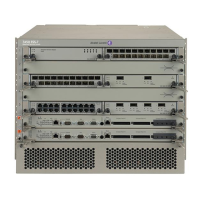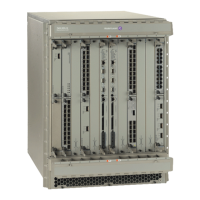Overview
524 Quality of Service Guide
Frame-Based Accounting
The standard accounting mechanism uses ‘packet based’ rules that account for the DLC
header, any existing tags, Ethernet payload and the 4 byte CRC. The Ethernet framing
overhead which includes the Inter-Frame Gap (IFG) and preamble (20 bytes total) are not
included in packet based accounting. When frame based accounting is enabled, the 20 byte
framing overhead is included in the queue CIR, PIR and scheduling operations allowing the
operations to take into consideration on-wire bandwidth consumed by each Ethernet packet.
Since the native queue accounting functions (stats, CIR and PIR) are based on packet sizes
and do not include Ethernet frame encapsulation overhead, the system must manage the
conversion between packet based and frame based accounting. To accomplish this, the
system requires that a queue operates in frame based accounting mode, and must be managed
by a virtual scheduler policy or by a port virtual scheduler policy. Egress queues can use
either port or service schedulers to accomplish frame based accounting, but ingress queues
are limited to service based scheduling policies.
Turning on frame based accounting for a queue is accomplished through a frame based
accounting command defined on the scheduling policy level associated with the queue or
through a queue frame based accounting parameter on the aggregate rate limit command
associated with the queues SAP, multi-service site or subscriber or multi-service site context.
Operational Modifications
To add frame overhead to the existing QoS Ethernet packet handling functions, the system
uses the already existing virtual scheduling capability of the system. The system currently
monitors each queue included in a virtual scheduler to determine its offered load. This offered
load value is interpreted based on the queues defined CIR and PIR threshold rates to
determine bandwidth offerings from the queues virtual scheduler. When egress port based
virtual scheduling was added, frame based usage on the wire was added to allow for the port
bandwidth to be accurately allocated to each child queue on the port.
